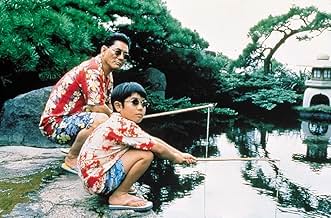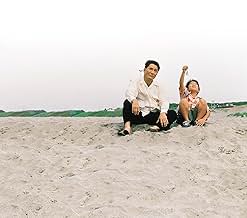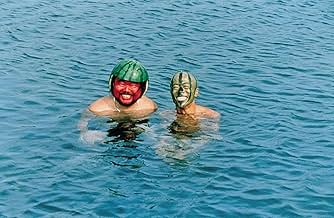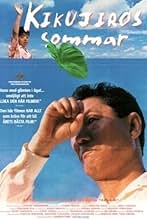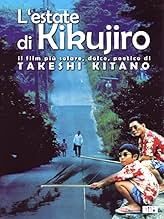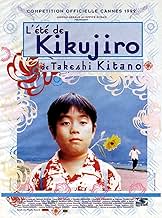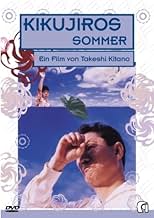IMDb रेटिंग
7.7/10
23 हज़ार
आपकी रेटिंग
एक युवा, भोला लड़का अपनी स्वच्छंद माँ को खोजने के लिए सड़क पर अकेला निकल जाता है. जल्द ही वह एक कट्टर आदमी में एक अप्रत्याशित रक्षक को पाता है और दोनों के साथ रास्ते में कई सारी अप्रत्याशित ... सभी पढ़ेंएक युवा, भोला लड़का अपनी स्वच्छंद माँ को खोजने के लिए सड़क पर अकेला निकल जाता है. जल्द ही वह एक कट्टर आदमी में एक अप्रत्याशित रक्षक को पाता है और दोनों के साथ रास्ते में कई सारी अप्रत्याशित घटनाएं घटित होती हैं.एक युवा, भोला लड़का अपनी स्वच्छंद माँ को खोजने के लिए सड़क पर अकेला निकल जाता है. जल्द ही वह एक कट्टर आदमी में एक अप्रत्याशित रक्षक को पाता है और दोनों के साथ रास्ते में कई सारी अप्रत्याशित घटनाएं घटित होती हैं.
- पुरस्कार
- 4 जीत और कुल 4 नामांकन
Takeshi Kitano
- Kikujiro
- (as Beat Takeshi)
The Great Gidayû
- Biker
- (as Gurêto Gidayû)
Beat Kiyoshi
- Man at Bus Stop
- (as Bîto Kiyoshi)
Yôji Tanaka
- Yakuza Henchman
- (as Yoji Tanaka)
फ़ीचर्ड समीक्षाएं
Maybe Takeshi Kitano remembered his travel with his father (Kikujiro), maybe he just wanted to show his father just like he wanted to see him. Anyway this film, despite of very few words and quite simple dialogue lines, shows so many emotions that after seeing it, sometimes laughing, sometimes sad and full of empathy, i have spent many days thinking of it. How can grown-up simple man witch is not quite good in relationships with people, can spent so much time with little boy. How so violent person can show beautiful world to sad little boy. Takeshi is one of my favorite actor/director/writer. I discovered him just by being bored with all-the-same Hollywood movies. Now, thanks to him, I'm truly in "love" with Asian movies. For those who liked this movie, and wants to see some good others, see the Hana-Bi (little violent, but even more deep) and Dolls (i was crying - one reason was i was touched, second - beauty of the colors and form).....For me its just one word - Outstanding.
Western audiences basically only know Beat Takeshi for his tough guy persona. Japanese audiences have seen many sides to him for a long time, and probably regard him as a comedian more than anything else. Maybe this is the reason why 'Kikujiro' isn't all that well known. Takeshi wrote and directed this movie as a follow up to his most celebrated work 'Hana-bi', but as it isn't a yakuza crime drama, it seems to have been largely overlooked. And that's a damn shame, because it's a very good movie, and anyone who enjoys Kitano's work will enjoy it. On paper the plot looks very Disney-like (grumpy old coot hits the road with an unhappy kid), but hey, this is Beat Takeshi, so what he does with it is always original and surprising. Much of the movie is playful, but then much of 'Sonatine' was too, only 'Kikujiro' doesn't mix that up with the orgy of violence you might expect from watching Kitano's better known movies. However it does have some dark moments that you would NEVER see in a Hollywood film dealing with similar "heart warming" subject matter, especially the "scary man" sequence featuring Akaji Maro, an actor you might recognise from Tarantino's 'Kill Bill'. I enjoyed 'Kikujiro' a lot, and the more Kitano movies I see, the more I think he is one of the most underrated directors working today.
In the title role of this highly original 1999 road movie, Beat Takeshi - with his twitching eye and bow-legged shuffle - looks and acts like a cross between Mickey Rourke and Harvey Keitel with a heavy dose of Walter Matthau's sourpuss demeanor (circa "The Bad News Bears") for good measure. He creates a truly memorable character - cynically profane, unapologetically insulting, childishly manipulative and somehow likable. As the director and screenwriter of said film, Takeshi Kitano - the same guy - has fashioned something quite unique from a tired premise - a boy's search for his mother and the gruff man who begrudgingly helps find her. What could have been a predictable and sentimental wallow, especially with the indiscriminate use of angels as a pervasive symbol, is instead an idiosyncratic, emotionally adroit film that sometimes simmers on the cusp of violence.
Yet it becomes ultimately affecting almost in spite of itself. In fact, Kitano does such a resolutely offbeat job that at certain times, the film reminds me of the narrative ellipses and low steady shots that were the trademark of Yasujiro Ozu's home dramas, intermingled with a surprisingly intense Quentin Tarantino-like, in-your-face edginess. The protagonist of the film is really the latch-key nine-year old, Masao, who is on a quest to find the mother whom his grandmother says is "away working". With his sad eyes and cherubic face, Yusuke Sekiguchi is perfectly cast as Masao providing the moral compass for the story. Whether he is running with his arms flailing or forlornly playing soccer by himself, he is poignant without being saccharine and completely natural. It is Masao's scrapbook that provides the framework for the film lending each chapter a descriptive title. Every chapter has a distinct character that is, in various turns, playful, hilarious, disturbing, surreal and heartbreaking. Case in point: Kitano is not afraid to use a child molester as first an uncomfortable source of black humor and then as the subject of Masao's nightmare. My favorite scenes come toward the end when Kikujiro organizes a motley crew of misfits to play games with Masao and have them masquerade as Indians, aliens, marine life and even watermelons. The variety in tone between chapters makes for unexpected tonal shifts, but somehow it works and adds to the greater context of the story.
That Kitano is able to manage a consistent film-making style with a strong visual sense is a credit to the talent behind the camera - not only Kitano's direction, script and film editing but also his artwork showcased throughout the movie, Katsumi Yanagishima's sharply rendered cinematography and Joe Hisaishi's evocative Windham Hill-like score. There are some funny sideline performances from Gidayu Great and Rakkyo Ide as Fatso and Baldy, two bikers who turn out to be the Abbott and Costello of soft-hearted slackers; Nezumi Mamura as a free-spirited drifter; Fumie Hosokawa as a relentlessly perky girl with a talent for juggling; and in the opening sequence, Kayoko Kishimoto as Kikujiro's take-no-prisoners wife. Kitano, however, elicits the most laughs if only for the film's central conceit that he gets away with his infantile gangster behavior. One would think the story would climax when Masao comes upon his mother, but Kitano confounds expectations with every new scene. The DVD really has no extras other than a couple of trailers not related to the film (not coincidentally, one is for Walter Salles' "Central Station" which has a similar story structure). I know this film has its detractors, especially among fans of Kitano's bloodier work, but I find it intriguingly ambiguous and thoroughly enjoyable.
Yet it becomes ultimately affecting almost in spite of itself. In fact, Kitano does such a resolutely offbeat job that at certain times, the film reminds me of the narrative ellipses and low steady shots that were the trademark of Yasujiro Ozu's home dramas, intermingled with a surprisingly intense Quentin Tarantino-like, in-your-face edginess. The protagonist of the film is really the latch-key nine-year old, Masao, who is on a quest to find the mother whom his grandmother says is "away working". With his sad eyes and cherubic face, Yusuke Sekiguchi is perfectly cast as Masao providing the moral compass for the story. Whether he is running with his arms flailing or forlornly playing soccer by himself, he is poignant without being saccharine and completely natural. It is Masao's scrapbook that provides the framework for the film lending each chapter a descriptive title. Every chapter has a distinct character that is, in various turns, playful, hilarious, disturbing, surreal and heartbreaking. Case in point: Kitano is not afraid to use a child molester as first an uncomfortable source of black humor and then as the subject of Masao's nightmare. My favorite scenes come toward the end when Kikujiro organizes a motley crew of misfits to play games with Masao and have them masquerade as Indians, aliens, marine life and even watermelons. The variety in tone between chapters makes for unexpected tonal shifts, but somehow it works and adds to the greater context of the story.
That Kitano is able to manage a consistent film-making style with a strong visual sense is a credit to the talent behind the camera - not only Kitano's direction, script and film editing but also his artwork showcased throughout the movie, Katsumi Yanagishima's sharply rendered cinematography and Joe Hisaishi's evocative Windham Hill-like score. There are some funny sideline performances from Gidayu Great and Rakkyo Ide as Fatso and Baldy, two bikers who turn out to be the Abbott and Costello of soft-hearted slackers; Nezumi Mamura as a free-spirited drifter; Fumie Hosokawa as a relentlessly perky girl with a talent for juggling; and in the opening sequence, Kayoko Kishimoto as Kikujiro's take-no-prisoners wife. Kitano, however, elicits the most laughs if only for the film's central conceit that he gets away with his infantile gangster behavior. One would think the story would climax when Masao comes upon his mother, but Kitano confounds expectations with every new scene. The DVD really has no extras other than a couple of trailers not related to the film (not coincidentally, one is for Walter Salles' "Central Station" which has a similar story structure). I know this film has its detractors, especially among fans of Kitano's bloodier work, but I find it intriguingly ambiguous and thoroughly enjoyable.
If it wasn't for the perverted old man and the language, this would probably be a really good children's movie. Who knows, maybe it's intended to be...
Anyway, little Masao lives with his grandmother and has never met his parents: his father is dead and his mother ran away. He knows where his mother lives, however, and wants to go visit her over the Summer, so his kindly neighbor conscripts her profligate husband to take him. "Mister", as Masao calls him, doesn't make the ideal companion with his absurd behavior and his verbal abuse, but they go off to adventure anyways and learn to really connect with each other.
The power this film has lies mostly in its contemplative approach. It's very humorous and isn't really slow, but the camera does take the time to linger on locales, faces, and characters. For a few odd parts here and there, it's still really innocent and it seems to show that most people are kind-natured at heart, even when they project an aura of toughness and abusiveness. An interesting aside to analyze that theme would be the carnival scene, where people entrusted with family entertainment turn out to be violent cheaters, whereas even the heavy-metal biker folk are more than willing to go out of their way to help Masao.
The film itself is from Masao's perspective, as a childhood's slightly photographic memory comes into play, mixed a lot with colorful imagination. The humor is the best part, as it is at times really simple but holds itself up well. There's a lot to enjoy in this film.
--PolarisDiB
Anyway, little Masao lives with his grandmother and has never met his parents: his father is dead and his mother ran away. He knows where his mother lives, however, and wants to go visit her over the Summer, so his kindly neighbor conscripts her profligate husband to take him. "Mister", as Masao calls him, doesn't make the ideal companion with his absurd behavior and his verbal abuse, but they go off to adventure anyways and learn to really connect with each other.
The power this film has lies mostly in its contemplative approach. It's very humorous and isn't really slow, but the camera does take the time to linger on locales, faces, and characters. For a few odd parts here and there, it's still really innocent and it seems to show that most people are kind-natured at heart, even when they project an aura of toughness and abusiveness. An interesting aside to analyze that theme would be the carnival scene, where people entrusted with family entertainment turn out to be violent cheaters, whereas even the heavy-metal biker folk are more than willing to go out of their way to help Masao.
The film itself is from Masao's perspective, as a childhood's slightly photographic memory comes into play, mixed a lot with colorful imagination. The humor is the best part, as it is at times really simple but holds itself up well. There's a lot to enjoy in this film.
--PolarisDiB
Kikujiro is a movie with beautiful calmness that's a great diversity from the fast cut movies today. Takeshi Kitano proofs once and for all, that he's a master filmmaker that will forever be remembered. And even though he dislikes the fame that goes along with his more successful movies (Zatoichi), it's a shame he doesn't get more recognition for his films.
Kikujiro no natsu tells the story of a kid who decides to visit his mother that he never met. Through odd circumstances kikujiro (Kitano), though absolutely unqualified, is forced to lead the kid. But as we see only moments later the boy would be better off alone, as kikujiro's fondness of gambling and (very amusing) way to treat people makes the journey a funny and quite touching odyssee.
What stands out in this movie is the simple comedy. It shows Kitano started off as a comedian, and his dialogue and acting made me almost spill my milk more than a few times. This is certainly one of his best. A great film for a quiet, rainy sunday afternoon.
Kikujiro no natsu tells the story of a kid who decides to visit his mother that he never met. Through odd circumstances kikujiro (Kitano), though absolutely unqualified, is forced to lead the kid. But as we see only moments later the boy would be better off alone, as kikujiro's fondness of gambling and (very amusing) way to treat people makes the journey a funny and quite touching odyssee.
What stands out in this movie is the simple comedy. It shows Kitano started off as a comedian, and his dialogue and acting made me almost spill my milk more than a few times. This is certainly one of his best. A great film for a quiet, rainy sunday afternoon.
क्या आपको पता है
- ट्रिवियाTakeshi Kitano made this gentler film as an antidote to his usual violent gangster movies.
- क्रेज़ी क्रेडिटThere's one more scene after the credits.
- कनेक्शनFeatured in Jam session - Kikujiro no natsu koshiki kaizokuban (1999)
- साउंडट्रैकSummer
Written by Joe Hisaishi
टॉप पसंद
रेटिंग देने के लिए साइन-इन करें और वैयक्तिकृत सुझावों के लिए वॉचलिस्ट करें
- How long is Kikujiro?Alexa द्वारा संचालित
विवरण
- रिलीज़ की तारीख़
- कंट्री ऑफ़ ओरिजिन
- आधिकारिक साइटें
- भाषा
- इस रूप में भी जाना जाता है
- Kikujiro
- फ़िल्माने की जगहें
- Sensoji Temple, Asakusa, Taito, टोक्यो, जापान(Masao and his friend walk across the temple grounds)
- उत्पादन कंपनियां
- IMDbPro पर और कंपनी क्रेडिट देखें
बॉक्स ऑफ़िस
- US और कनाडा में सकल
- $2,00,920
- US और कनाडा में पहले सप्ताह में कुल कमाई
- $28,079
- 28 मई 2000
- दुनिया भर में सकल
- $2,81,527
- चलने की अवधि2 घंटे 2 मिनट
- रंग
- ध्वनि मिश्रण
- पक्ष अनुपात
- 1.85 : 1
इस पेज में योगदान दें
किसी बदलाव का सुझाव दें या अनुपलब्ध कॉन्टेंट जोड़ें



